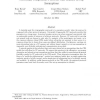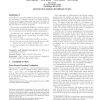403 search results - page 46 / 81 » Secure Protocols with Asymmetric Trust |
CSFW
2011
IEEE
12 years 8 months ago
2011
IEEE
—We present a Horn-clause-based framework for analysing security protocols that use platform configuration registers (PCRs), which are registers for maintaining state inside the...
PKC
2007
Springer
14 years 2 months ago
2007
Springer
Abstract. Direct anonymous attestation (DAA) is an anonymous authentication scheme adopted by the Trusted Computing Group in its specifications for trusted computing platforms. Th...
WETICE
1998
IEEE
14 years 22 days ago
1998
IEEE
Much work is going into securing the public key infrastructure (PKI). Various models for trust exist; Pretty Good Privacy (PGP) and the Progressive-Constraint Trust model are exam...
FOCS
2004
IEEE
14 years 6 days ago
2004
IEEE
A desirable goal for cryptographic protocols is to guarantee security when the protocol is composed with other protocol instances. Universally Composable (UC) protocols provide th...
PODC
2004
ACM
14 years 1 months ago
2004
ACM
Secure function evaluation (SFE) enables a group of players, by themselves, to evaluate a function on private inputs as securely as if a trusted third party had done it for them. ...


